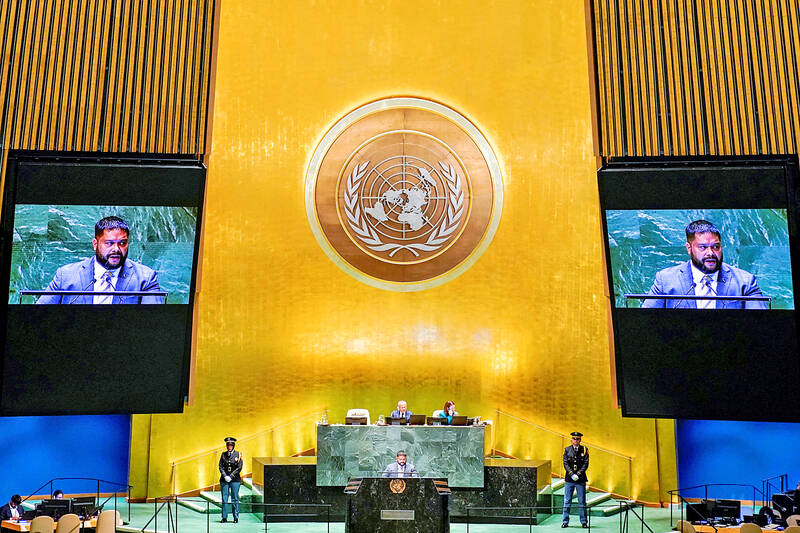Nauruan President Russ Joseph Kun on Thursday voiced support for Taiwan’s inclusion in the UN, and thanked the country for its continued support and aid.
In his address on the third day of the 78th General Debate, Kun called for wider recognition of Taiwan, emphasizing its right to participate in the global forum and “in the implementation of the 2030 agenda and its Sustainable Development Goals.”
Kun also praised Taiwan for its handling of COVID-19 and said that Nauru must thank Taiwan for supporting its healthcare system.

Photo: Reuters
Taiwan “was and is continuing to be a leading example in good practice to responding to and containing the disease,” he said.
On the second day of the General Debate, Eswatini and the Marshall Islands also voiced support for Taiwan’s inclusion in the UN.
In response to that support, President Tsai Ing-wen (蔡英文) said on social media that she was thankful for the statements made by Eswatini King Mswati III and Marshall Islands President David Kabua in support of Taiwan and for highlighting how important its inclusion in the UN system is for sustainability and global stability.

Photo courtesy of the Taipei Economic and Cultural Office in New York via CNA
Meanwhile, Representative to the US Hsiao Bi-khim (蕭美琴) on Wednesday thanked allies for their support of Taiwan at an event held by the Taipei Economic and Cultural Office in New York.
Palauan President Surangel Whipps Jr attended the event, along with Kabua, as well as representatives from more than 100 like-minded countries, the office said in a statement.
Hsiao said in the statement that peace and stability in the Taiwan Strait are vital to the security and prosperity of the international community.
Hsiao added that she was glad to see a statement last month from the G7 foreign ministers stating that they “reaffirm their shared commitment to maintaining the rules-based international order, peace and stability across the Taiwan Strait and beyond.”
At the event, Whipps said that Palau highly values its relationship with Taiwan, and thanked Taiwan for helping the country during the COVID-19 pandemic.
He urged the UN to recognize that 23 million Taiwanese should not be excluded from the global organization and to truly realize the vision of “Leave no one behind.”
Also at the event, Kabua reiterated his support for Taiwan joining the UN.
The 78th UN General Assembly began on Sept. 5 at UN headquarters in New York and the General Debate runs through Tuesday next week.
Taipei had asked its 13 diplomatic allies and other like-minded countries to express support for its inclusion in the UN, either by speaking up during the General Assembly or sending letters to UN Secretary-General Antonio Guterres.

MORE VISITORS: The Tourism Administration said that it is seeing positive prospects in its efforts to expand the tourism market in North America and Europe Taiwan has been ranked as the cheapest place in the world to travel to this year, based on a list recommended by NerdWallet. The San Francisco-based personal finance company said that Taiwan topped the list of 16 nations it chose for budget travelers because US tourists do not need visas and travelers can easily have a good meal for less than US$10. A bus ride in Taipei costs just under US$0.50, while subway rides start at US$0.60, the firm said, adding that public transportation in Taiwan is easy to navigate. The firm also called Taiwan a “food lover’s paradise,” citing inexpensive breakfast stalls

US PUBLICATION: The results indicated a change in attitude after a 2023 survey showed 55 percent supported full-scale war to achieve unification, the report said More than half of Chinese were against the use of force to unify with Taiwan under any circumstances, a survey conducted by the Atlanta, Georgia-based Carter Center and Emory University found. The survey results, which were released on Wednesday in a report titled “Sovereignty, Security, & US-China Relations: Chinese Public Opinion,” showed that 55.1 percent of respondents agreed or somewhat agreed that “the Taiwan problem should not be resolved using force under any circumstances,” while 24.5 percent “strongly” or “somewhat” disagreed with the statement. The results indicated a change in attitude after a survey published in “Assessing Public Support for (Non)Peaceful Unification

PLUGGING HOLES: The amendments would bring the legislation in line with systems found in other countries such as Japan and the US, Legislator Chen Kuan-ting said Democratic Progressive Party (DPP) Legislator Chen Kuan-ting (陳冠廷) has proposed amending national security legislation amid a spate of espionage cases. Potential gaps in security vetting procedures for personnel with access to sensitive information prompted him to propose the amendments, which would introduce changes to Article 14 of the Classified National Security Information Protection Act (國家機密保護法), Chen said yesterday. The proposal, which aims to enhance interagency vetting procedures and reduce the risk of classified information leaks, would establish a comprehensive security clearance system in Taiwan, he said. The amendment would require character and loyalty checks for civil servants and intelligence personnel prior to

The China Coast Guard has seized control of a disputed reef near a major Philippine military outpost in the South China Sea, Beijing’s state media said, adding to longstanding territorial tensions with Manila. Beijing claims sovereignty over almost all of the South China Sea and has waved away competing assertions from other countries as well as an international ruling that its position has no legal basis. China and the Philippines have engaged in months of confrontations in the contested waters, and Manila is taking part in sweeping joint military drills with the US which Beijing has slammed as destabilizing. The Chinese coast guard